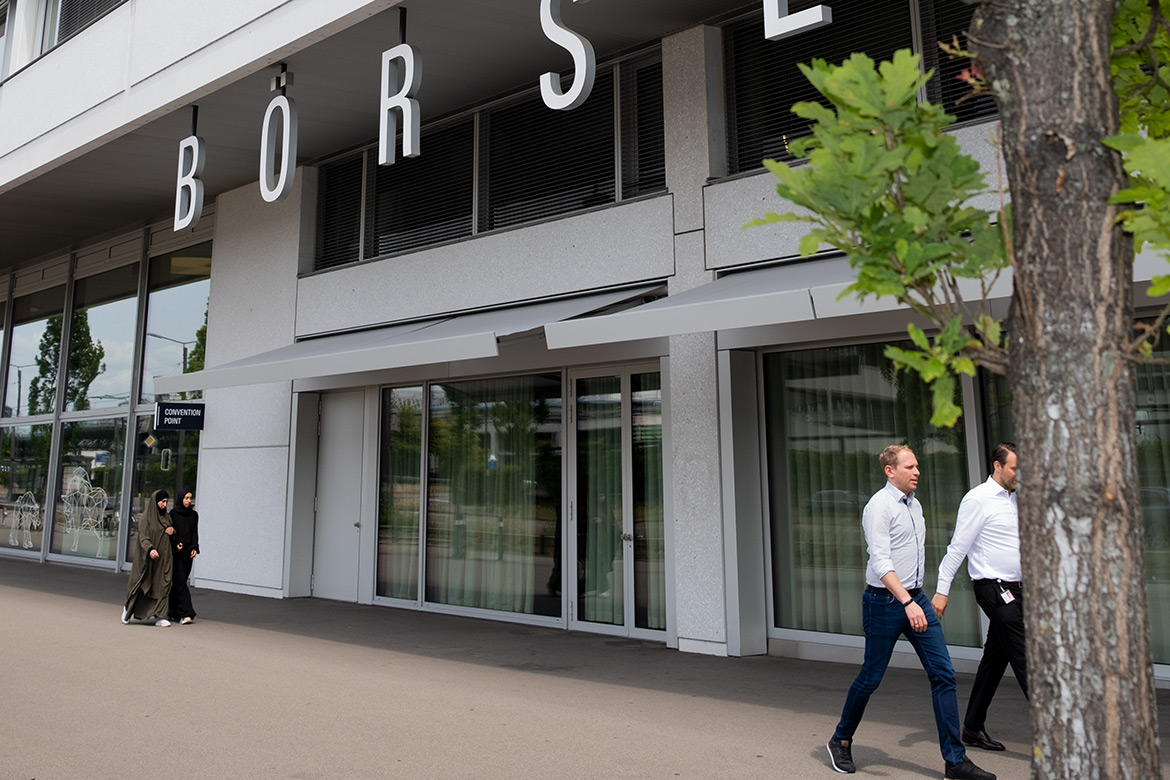Feature: How the cash flows
To give is nobler than to receive
Most people in Switzerland have a down-to-earth attitude towards money. But with bigger financial resources comes more influence – in politics and in love.

In Switzerland, the power obtained from the founding of a company isn’t primarily direct, as it is in the United States, but largely indirect through inheritance. | Photo: Tom Huber
When asked what money means to them, people in Switzerland generally have a pretty down-to-earth answer. For most people it’s a means to an end – something that makes you free and autonomous and enables you to do what’s important to you. Saving money is also important, with many having internalised their parents’ belief that you don’t spend more than you own.
The sociologist Caroline Henchoz is a professor at the School of Social Work and Health in Lausanne. Together with two of her colleagues, she’s been involved in a research project to investigate the financial socialisation of young people. They’ve found that while there is indeed great homogeneity in attitudes to money in Switzerland, cultural differences also emerge. For example, French-speaking citizens more often assign social significance to money than do the citizens of German-speaking Switzerland or of the Italian-speaking canton of Ticino. French speakers also see it in part as a symbol of prestige and power. According to Henchoz, those who use money to demonstrate power or to acquire it also handle their financial resources differently. After undertaking an online survey with almost 1,400 participants, they found that such people are more likely to have long-term debts such as leasing contracts or mortgages, and also more overdue bills. “When material goods are an important symbol of individual success”, she says, “the temptation seems all the greater to acquire more than you can actually afford”.
Being a man comes with privileges
Even in love, money has more to do with power than we might perhaps like to admit. As part of another research project, Henchoz interviewed some 60 couples about the meaning of money, and how they use it. She wanted to understand why the financial imbalance that characterises the different genders in society is often reproduced and maintained in our relationships, even though most couples clearly uphold ideals of equality. Women usually have less financial decision-making autonomy in matters of major household expenditure; they have fewer financial resources for personal expenses, and are less able to prepare for the uncertainties of the future. “The women we surveyed are very aware that they don’t have the same economic status as men, nor the same financial independence”, she says. Nevertheless, these women generally perceive their relationship as balanced, and feel neither patronised nor dominated.
If we are to understand this contradiction better, Henchoz believes we must first look at the glue that holds a couple together according to today’s understanding of what love is. Love reveals itself in how we orient our own actions and thoughts towards the well-being of our partner. Giving is the currency involved here. “But just what is actually suitable as a ‘contribution’ in order to demonstrate our bond with the other person, and strengthen it, depends very much on our gender”.
This is especially evident when it comes to money. The man’s income is usually seen as a contribution to the wellbeing of a family, with his gainful employment in line with expectations of his societal role. But this is not necessarily true for women. “In more traditional families, if the woman is employed, this is perceived more as a cost factor, as a personal need for self-fulfilment that prevents her from properly fulfilling her domestic duties”, says Henchoz. As a result – regardless of the amount – the money she brings home carries less weight on the scales of marital exchange than money earned by a man. Nor do housework and work for the family outweigh the man’s contribution. In addition to earning money, such housework might even be seen as something that the woman owes her family out of gratitude for having been granted the fulfilment of her desire for gainful employment.
But if neither women’s money nor housework has the same value as a man’s income, why are the couples that Henchoz’s team interviewed nevertheless convinced that both partners contribute equally to their relationship? Throughout these interviews, Henchoz found that “the generosity of the woman manifests itself quite fundamentally in her conscious acquiescence in male privileges”. For example, she might allow him to spend more on himself than she would. In this way, the woman legitimises and consolidates the financial power imbalance in their relationship. But at the same time, the man’s privileges are not so much a consequence of male dominance, but of female generosity. These privileges are perceived as having been chosen voluntarily, agreed jointly, and easily reversible. This means they also do not contradict any ideals of equality. “But a real balance will not simply depend on the goodwill of couples”, Henchoz insists. “It will also depend very much on the political measures that are taken up to promote equal pay and to enable both women and men to reconcile their private and professional lives”.
Giving is not just giving
Giving is also an important virtue in society as a whole – making charitable donations, for example – though it brings influence with it too. Donations make many things possible that would otherwise be almost impossible to fund, says the sociologist Ueli Mäder, a retired professor of the University of Basel. But the only causes that attract funding are those that donors consider important. Tax relief is also an important subsidiary motive. Mäder has written a book on this topic, entitled ‘Wie Reiche denken und lenken’ (How the rich think and influence things). In it, he notes that Switzerland is second only to the USA in the amount of charitable donations made per capita. But as Mäder points out, higher taxes for the richest citizens would do far more to change structural inequalities in society than charity ever could: “Private patronage can complement the welfare state, but it can’t replace it”.
What’s especially important is that opportunities for advancement in a country shouldn’t depend on money. Democratic societies agree that everyone ought to have the same opportunities, regardless of their social background or the financial circumstances of their parents. Isabel Martínez is an economics researcher at the KOF Swiss Economic Institute at ETH Zurich, and she believes that access to education plays a crucial role in equality of opportunity.
The problem is, however, that educational mobility in Switzerland is below average. If a child has at least one parent with a university degree, they are five times more likely to go to a selective high school than working-class children. “All the same, Switzerland is in a good position when it comes to earned income”, she says. On average, children from the bottom quarter of income distribution reach the middle of salary distribution. “The Swiss vocational training system has so far managed to secure a solid financial basis and career advancement opportunities for people who have completed an apprenticeship”.
Money is not the only decisive factor that determines someone’s education, says Martínez. “The value that a family attaches to education is just as important”. Since the educational level of parents correlates strongly with their income, it is difficult to tease out what factors have the greater influence. “More equality of opportunity also makes sense from a liberal perspective”, she says. This is because it’s not really economically efficient if people train as surgeons just because their parents had already studied medicine. Surgeons should be those who can best handle a scalpel, regardless of whether their father is a chief physician or a taxi driver.
Those who have, have inherited
Switzerland’s biggest inequalities come down to assets, says Martínez. There is hardly anywhere else in the world where wealth is as concentrated as here, where the richest one percent owns some 40 percent of total assets. Martínez and her research team recently investigated the extent to which changes in taxation might be responsible for the increasing concentration of wealth that has taken place in recent decades. They found that the tax regulations only explain 20 to 25 percent of this increase. Switzerland’s long avoidance of wars and its consistent economic policy have also played a major role – as has the fact that it’s an attractive country for multinational companies and for wealthy people from all over the world. This naturally also has to do with the country’s tax policies and the competition in taxation that occurs between different cantons.
This increasing concentration of wealth is also a likely result of the erosion of inheritance tax. Since the late 1990s, almost all cantons have abolished it for direct descendants, and it does not even exist at the federal level. Today, however, Martínez points out that bequests make up a considerable percentage of the wealth of the super-rich. According to the business magazine Bilanz, some 60 percent of the 300 richest people in Switzerland have inherited their wealth. In the United States, by contrast, only 30 percent of the Forbes 400 have inherited their fortunes. Over there, most of the rich have acquired their wealth by founding their own companies.
“At some point, this tendency becomes questionable from a democratic point of view”, says Martínez. “After all, assets, income and influence correlate strongly with each other”. This development also raises questions about whether an economy is innovative enough if people are able to make it to the top of wealth distribution without successful ideas, but with rich parents. “Success in politics today is also much more a question of financial means and having a good network”, adds Mäder. Political campaigning and winning elections cost much more money than they did in the past – and having good contacts is very much connected to your social background. “Today, displaying great commitment at communal and cantonal level is no longer sufficient to catapult you into high positions in politics”.
“If a higher inheritance tax is going to change anything about the current situation”, says Martínez, “it will have to hurt”. In political terms, there’s little chance of getting a tax of, say, 50 percent on the biggest fortunes. And it wouldn’t do anything to change the fact that rich kids get a better start in life. But it might at least send a signal that people in future shouldn’t rely so heavily on being funded by rich parents.




